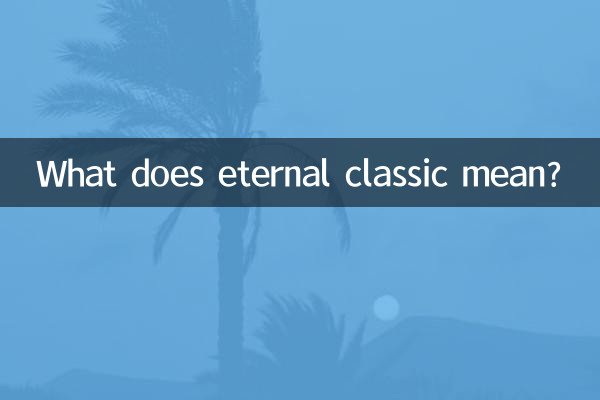What does eternal classic mean?
In the era of information explosion, countless new topics and hot contents emerge every day, but there are very few contents that can truly be called "forever classics." So, what is a timeless classic? It is not just a temporary popularity, but a cultural symbol or work that can stand the test of time and continue to resonate. This article will start from the hot topics on the Internet in the past 10 days and explore the connotation of the concept of "eternal classic".
1. Inventory of hot topics on the Internet in the past 10 days

The following are some of the hot topics and hot topics discussed on the Internet in the past 10 days, organized into a table:
| Topic Category | Specific content | heat index |
|---|---|---|
| Film and television entertainment | "Oppenheimer" global box office exceeds $900 million | ★★★★★ |
| Technology trends | Apple launches iPhone 15 series at autumn conference | ★★★★☆ |
| social hot spots | Japan's discharge of nuclear wastewater into the sea sparks international controversy | ★★★★★ |
| cultural phenomenon | The drama adaptation of "Dream of Red Mansions" is once again popular | ★★★☆☆ |
| sporting events | China men's basketball World Cup defeat sparks discussion | ★★★★☆ |
2. The difference between classics and popular
As can be seen from the above hot topics, some content is only a short-term hot topic, while some may become "forever classics." The differences between the two are mainly reflected in the following aspects:
1.time dimension: Hot topics often only attract attention in a short period of time, while classics can span generations and continue to be mentioned and discussed. For example, "A Dream of Red Mansions" has been a classic in the literary world since its birth.
2.cultural value: Classics usually have profound cultural connotations or universal values and can resonate with different eras and different people. Shakespeare's plays, for example, are still widely performed and studied today.
3.influence: The influence of classics often transcends their original fields and becomes cultural symbols. For example, the Mona Lisa is not only a painting, but also a symbol of Western art.
3. How to judge "forever classic"
Combining recent hot topics, we can summarize the following judgment criteria:
| Standard | Description | Example |
|---|---|---|
| persistence | able to be watched and discussed for a long time | "Journey to the West" |
| Universality | Across cultural and geographical boundaries | Beethoven symphony |
| innovativeness | Groundbreaking in its field | Einstein's theory of relativity |
| emotional resonance | Can arouse common human emotions | "Titanic" |
4. Transformation from popular to classic
Not all popular content can become classics, but classics often originate from hits. Take recent topics as an example:
1."Oppenheimer": As Nolan’s new work, it may become a classic in future film history due to its profound reflection on historical events and artistic expression.
2.iPhone 15 series: Although new iPhones arouse heated discussions every year, only products as revolutionary as the original iPhone will be recorded in history.
3."Dream of Red Mansions" drama: The original work itself is a classic. Whether a new adaptation can become a classic depends on its artistic achievements and significance of the times.
5. Conclusion
"Eternal classics" are not determined by temporary popularity, but require the precipitation of time and the filtering of culture. While chasing hot topics, we should also learn to appreciate those works and ideas that truly have eternal value. Perhaps some of today's hot topics will one day become classics in the eyes of future generations.
By analyzing recent hot topics, we can more clearly realize that the charm of classics lies in their ability to transcend time and constantly be given new meanings. This is what "forever classic" really means.

check the details

check the details